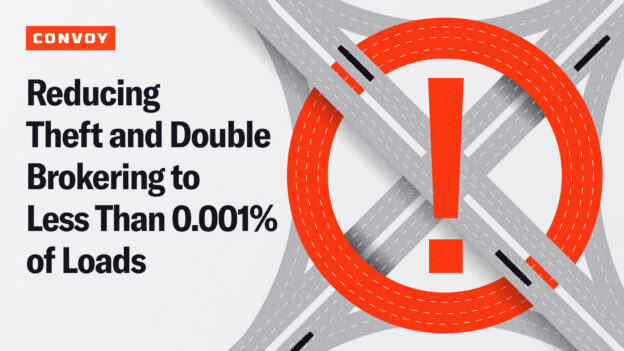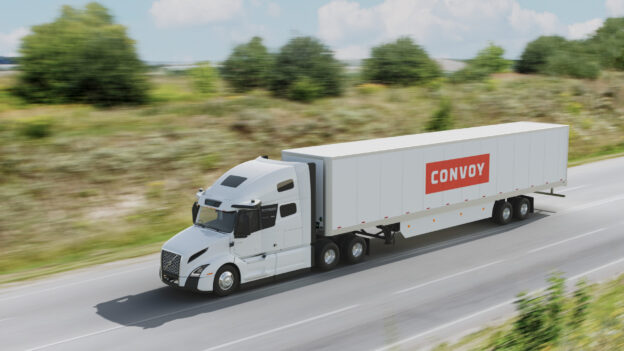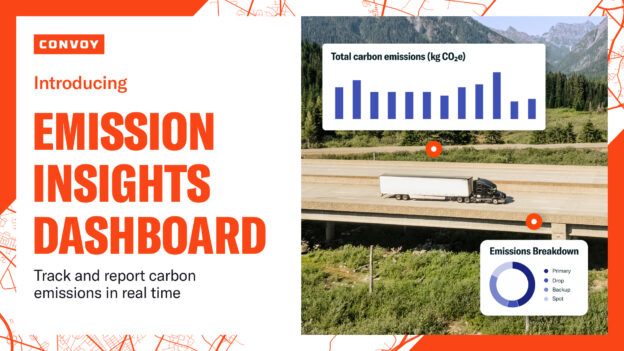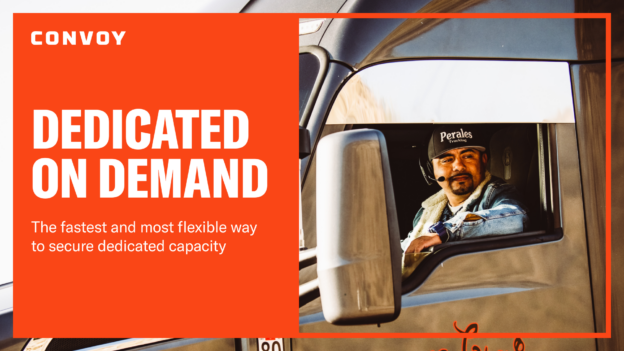Cultivating Sustainability And Regeneration With Guayaki Yerba Mate’s Gretchen Grani
Shippers, Sustainability • Published on January 20, 2021
When organizations begin to incorporate sustainability practices, they must recognize it is a journey. Sustainability is not something to be done once and checked off the “to do” list. It is an ever-evolving process which flows throughout an organization and delves deeper into the fabric of a company with each passing year. Sustainable practices are cultivated and nurtured with an ever-changing target as organizations realize there is always something more to be done.
For a better idea of how the sustainability function can magnify and intensify, I sat down with Gretchen Grani, Regeneration & Sustainability Lead at Guayaki Yerba Mate co, an organic beverage company specializing in yerba mate products. In addition to offering loose-leaf yerba mate, Guayakí also sells canned as well as carbonated yerba mate drinks, and energy shots.
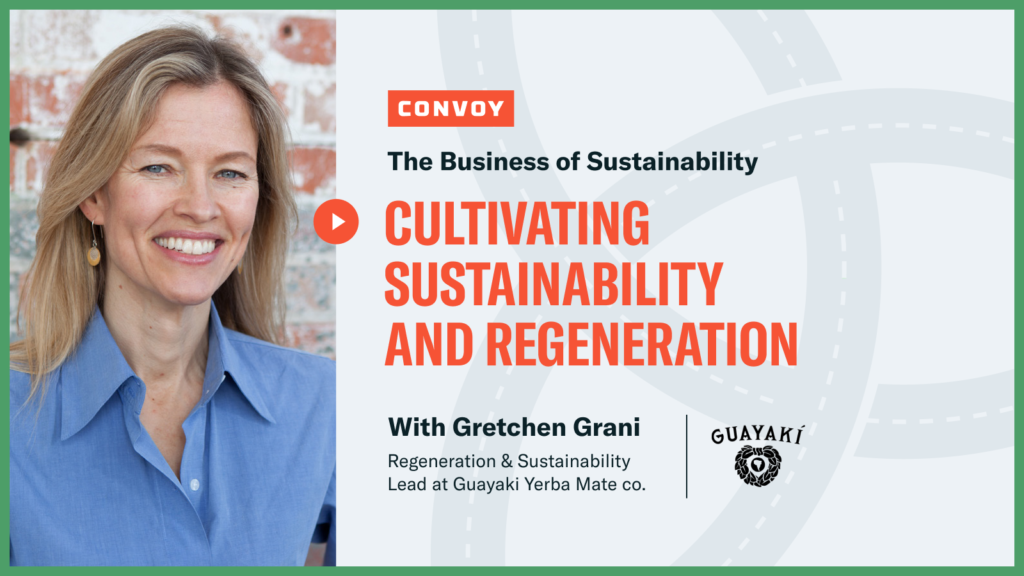
This was our first discussion with a sustainability leader who addressed regenerative sustainability and how that translates throughout an organization. Gretchen’s key takeaways on the subject follow.
- The Difference Between Sustainability And Regeneration: Sustainability is focusing on reducing negative impact. Regeneration is looking at how we can increase our positive impact and build the capacity for living systems (people, stakeholders, workers, natural resources, etc.) to self-regenerate. There is a place for both approaches. (1:46)
- How You Can Drive Change: Society right now is in the middle of a major paradigm shift from extractive business to sustainable to regenerative. It takes a lot of time for major shifts and so we must live in both worlds for a while so we can bring people along. As a sustainability leader driving change, I focus on continual improvement across the whole company, whether it is managing our impact on our resource consumption, employee engagement, or governance. My specific responsibilities incorporate strategy and design of programs and policies, certifications, fit for life, B corporation, green business, and impact metrics and reporting. (2:12)
- Assessing The Value Of Sustainability: There is a lot of evidence that sustainable brands have a premium market value. This is being driven by consumers who want to make an impact with their purchases and look for mission-driven companies. Sustainability value also extends beyond consumers to all the stakeholders. Social impact investors look to make an impact through their investments. Employees want to work with a company they believe in. Producers are receiving fair-trade, enhanced value in their land. The value of sustainability to the world is leveling the playing field. Shareholder profit is no longer the only benchmark. It’s about enhancing social justice and equity, soil health and biodiversity, carbon and water benefits, and worker health. It is really investing in the resilience of those very things we rely on to operate and viewing company assets as more than what you would find on a financial balance sheet. (2:58)
- How To Build Upon Sustainability Initiatives Over The Long Term: Guayaki Yerba Mate is constantly evolving as a company and our sustainability initiatives are evolving as well. When we began 25 years ago, we focused on building relationships with indigenous stewards of the indigenous rainforest and bringing the yerba mate which grows natively in their territory to market. Since then, we have more recently focused on sustainable development of those territories and partnerships with nonprofits like the World Wildlife Foundation in Paraguay. About five years ago we also merged with our distribution company and have a fleet of mostly electric vehicles as well as 30 warehouses and offices to manage. So now our effort incorporates fleets and facilities, renewable energy, and waste programs. We also started a relationship with an anti-recidivism coalition and were able to hire formerly incarcerated individuals for the distribution company. Additionally, we formed a relationship with General Motors and worked with them to innovate a cargo version of the Chevy Bolt for delivery. (4:33)
- What It Will Take To Drive More Investment In Sustainability: We are already seeing shifts with new policies around climate and carbon pricing, electric vehicles, incentives for regenerative agriculture, and especially for food and beverage. This year we witnessed consumers step up and demand corporations support Black Lives Matter and offer diversity and inclusion programs. Leadership will be another important area of change. We need to see sustainability represented in the executive suite and on boards. And with all of the wildfires and hurricanes and social unrest, it’s becoming expensive to operate in an unstable world so risk is a significant area of importance. And the last thing, but definitely not the least, is a paradigm shift to see things as an extractive way of doing business and perceiving stakeholder value as essential for business success. (6:47)
- What Sustainability Looks Like At Guayaki Yerba Mate: A lot of people who buy our product don’t know about our program to hire formerly incarcerated individuals because it’s fairly new. I think the majority of our customers in the United States miss the connection with supporting indigenous communities and the rainforest that those communities steward in Paraguay, Brazil, and Argentina. As a brand, we are also committed to being net zero by 2030 as well as the regeneration of two million acres by 2030. Our 2020 mission to steward and restore 200 thousand acres of Atlantic forest was just achieved! And it’s not just environmental targets, but also making Guayaki an engaging, diverse, and inclusive place for our workers and sharing the spirit of regenerative yerba mate with the world. (9:56)
Watch the video or read the transcription below.
TRANSCRIPTION
Jennifer: What led you to Guayaki to lead their sustainability program?
Gretchen: We are a natural products brand and we offer organic, fair-trade, shade grown yerba mate beverages to the United States, Canada, and Chile. So, what led me to Guayaki specifically three and a half years ago is a combination of our leader’s deeply committed, conscious human beings and the company vision which inspires all to come to life. And so, my belief in the vision and in the leaders leading this organization, it gives me the self-motivation to work really hard and love what I do.
Jennifer: Your role involves regeneration and sustainability. What does that mean for leading those two areas at Guayaki?
Gretchen: I think sustainability is focusing on reducing negative impact and regeneration acts the opposite. [2:00] It’s how we can increase our positive impact and build the capacity for living systems whether that’s people, stakeholders, your workers, or the land we source from. How can you build the capacity for those systems to self-regenerate? And there’s a place for both approaches. I mean, I think of society right now as being in the middle of a major paradigm shift from extractive business to sustainable to regenerative. And it takes a lot of time for major shifts and so, you know, you must live in both worlds for a while so that you’re bringing people along. So, roles, I think, my role is really about driving change, continual improvement across the whole company whether it is managing our impact on like, our resource consumption, or employee engagement, or governance. So, my responsibilities include strategy and design of programs and policies, certifications, fit for life, B corporation, green business, impact reporting, impact metrics and reporting, and yeah…
Jennifer: It sounds like sustainability has been core to Guayaki since the very beginning. How does the company think about articulating the value of sustainability as a part of the business?
Gretchen: In terms of the value there’s a lot of evidence that sustainable brands have a premium market value. And this is being driven by consumers who, you know, they want to make an impact with their purchasing. So, we already know that but value…sustainability value extends beyond consumers [4:00] to really all the stakeholders. So social impact investors are looking to make an impact through their investments, employees who want to work with a company that they believe in. Producers who are receiving fair-trade. They’re receiving enhanced, you know, value in their land. And retail customers, they’re looking for mission driven companies to promote. So, I think the value to the world is leveling the playing field. So that shareholder profit isn’t the only benchmark. It’s, you know, it’s about enhancing, you know, social justice and equity, and soil health and biodiversity, carbon and water benefits, and worker health. And its really investing in the resilience of those very things that we rely on to operate and you know, viewing company assets is more than what you would find on a financial balance sheet.
Jennifer: You’re focused on so many different areas of sustainability and regeneration today, what is one area that you’re particularly excited about right now?
Gretchen: Oh, wow. There’s so many. Well, we’re constantly evolving as a company and so our sustainability initiatives are evolving and our relationships which influence those relationships are evolving and so you know, when we started out 25 years ago, we focused on building relationships with indigenous steward of the indigenous rainforest and brining the yerba mate that grows natively in their territory to market. And, you know, since then, what we’re focusing on more recently is more sustainable development of those territories [6:00] and partnerships with nonprofits like the World Wildlife Foundation at a partnership is Paraguay, that is a recent one. But really the big change for the company and for me is that we merged with our distribution company in the last couple of years. We started about 5 years ago and we have a fleet of mostly electric vehicles and we now have 30 warehouses and more offices to manage so, you know, fleets and facilities, and renewable energy and waste programs, and we have a G3 program with it, once again, from a relationship. We started with a relationship with the anti-recidivism coalition and we…with their knowledge were able to hire formally incarcerated for the distribution company. And, you know, since then we have hired one of the anti-recidivism coalition co-founders who directs our social impact and you know, we also along the way had a relationship with General Motors and worked with them to innovate versions of the new Chevy Bolt called a cargo version. This is for the delivery. So, yeah. There is a lot of new stuff that we’re working on because of this merger and because of the evolution point that we’re at right now.
Jennifer: You’ve already made huge investments in sustainability such as electric vehicles and bringing your operations in house. What do you think its going to take for more companies to make larger investments in sustainability in the future?
Gretchen: Well, that is the question, isn’t it? It’s a great question. [8:00] And we’re already seeing shifts, especially this year, like policy is a big one, right? So, you know, all the, you know, new policies around climate and carbon pricing, electric vehicles, incentives for regenerative agriculture, that’s shifting, you know, especially for food and beverage. Consumers demand this year we saw consumers step up and ask for the demand of corporations to support black lives matter and also to start having diversity and inclusion programs if they don’t have a lot of diversity. So, you know, all of that is happening, you know, even this year. Leaderships and other, you know, important change. It’s a slow moving one but we need to see sustainability represented in the executive suite and on boards. Risk is another big one. With all the wildfires and hurricanes and just social, you know, social unrest, it’s becoming risky and expensive to operate in an unstable world. And then, the last thing but definitely not the least is its going to require a paradigm shift which I think is happening and that’s, like I said, seeing things as an extractive way of doing business. To perceiving stakeholder value as essential for business success.
Jennifer: I have two more questions before we wrap up today. My first is about your Zoom background. Can you share more about the forest that you have behind you? I think most people have a specific reason why they’re choosing their Zoom backgrounds, today I would love to hear if yours has a story.
Gretchen: This is Argentina. [10:00] These are yerba mate trees. Here, I’ll try to get out of the way. These are yerba mate trees, and these is how our yerba mate grows. So, they’re yerba mate trees and then they’re tall native trees that shade them. And so, the vast vast majority of yerba mate grows like most crops grow, with chemicals, in the sun, in a monocrop, you know, in rows, and this is actually how yerba mate grows natively.
Jennifer: I love that background. I’m going to go download it right now. And just for my last question, for the average person that walks into the grocery store and finds their yellow can of yerba mate, what is something that they may not know about sustainability at Guayaki?
Gretchen: You know, that’s a really good question. I think a lot of them don’t know about our program to hire formerly incarcerated because it’s fairly new. I think if the majority of our customers are in the United States, and I think a lot of them might miss the connection with supporting indigenous communities and the rainforest that those communities steward in Paraguay, Brazil, and Argentina. They might not know about that. I think they know the brand is cool, but they might not realize that we’re committed to being net zero by 2030, we’re committed to regeneration of 2 million acres by 2030. These are all new impact targets because we just reached our mission. Our 2020 mission to steward and restore 200 thousand acres of Atlantic [12:00] forest. We did it.
Jennifer: Congratulations!
Gretchen: Thank you. Yeah, it’s huge for the company so we’re launching these big new targets and its not just those environmental targets but also make Guayaki engaging, diverse, and inclusive place to work is one for our workers and then share the spirit of regenerative yerba mate is our more community focused impact target. So, we have, you know, we have some really big targets to hit and its…everyone is backing those targets and feels good about what we’re doing but I’m not sure all the customers know about it. So, it’s nice to, yeah, it’s nice to share our stories.
Jennifer: Thank you so much for joining us today, Gretchen.
Gretchen: Thank you so much, Jennifer. It was an absolute pleasure.
